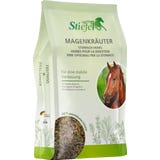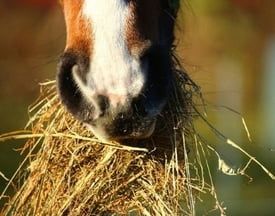Stomach Ulcers
When horses suffer quietly
What actually is a stomach ulcer?
Many horses suffer from stomach ulcers and quite a few horses suffer silently. Therefore, it is often not noticed for a long time that a horse is suffering from stomach pain.
A stomach ulcer is a "defect" in the stomach wall. It is caused by a prolonged inflammation in the stomach lining. The stomach lining protects the stomach wall. The food components that end up in the stomach are broken down by the aggressive stomach acid. If there is an imbalance between gastric acid and neutralising factors, the gastric acid also attacks the gastric mucosa and causes inflammation there. These can penetrate as far as the muscle layers in the stomach and cause defects.
The saliva, which optimally reaches the stomach in sufficient quantities with the food, is decomposed with neutralising enzymes and thus defuses the effect of gastric acid on the gastric mucosa.
What are the symptoms of a stomach ulcer?
Affected horses, like us humans, suffer from stabbing or persistent dull stomach pains. Since they cannot speak, we as horse owners have to be careful:
Many horses refuse to eat in acute cases. Some horses avoid the intake of cold water, which, to make matters worse, can lead to constipation colic as a result.
There are also horses that are sensitive to touch in the epigastric region. For example when cleaning or tightening the saddle girth.
The pain often causes the horses to cramp - similar to how we humans can bend over forwards when we have a bad stomach ache. You will then find it difficult to arch your back or to move forward easily.
Some affected horses become lethargic or aggressive when it comes to feeding. They then rush to the food, for example, because the ingestion of food means the ingestion of saliva and thus briefly relieves the pain caused by the ulcer.
What are the causes of stomach ulcers?
The most well-known cause of stomach ulcers is stress and the overproduction of stomach acid.
Stress can be triggered by various factors: On the one hand, by inappropriate husbandry with insufficient feed and/or little exercise, or on the other hand by a non-homogeneous herd. Above all, horses that are exposed to high pressure to perform very often suffer from gastric ulcers.
However, incorrect feeding is often the cause of stomach ulcers:
The horse's digestive tract is designed for permanent eating. As a result, the stomach is constantly producing stomach acid. The stomach acid is in turn neutralised by the saliva. Taking too long breaks in between eating or incorrect feeding (little hay, a lot of concentrated feed) imbalances the ratio and there is an excess of stomach acid, which in turn attacks the gastric mucous membrane. The quality of the feed also plays a role, of course. If the hay is contaminated or even mouldy, this can unbalance the environment in the stomach.
Diagnosis by the veterinarian
The veterinarian makes a reliable diagnosis by means of a gastroscopy. This is an examination of the inside of the stomach with a probe. To do this, the horse has to wait a few hours without food so that the stomach is empty and the doctor can look at the stomach wall with the aid of the gastroscope.
For an affected horse, this is also stressful, which can make the symptoms even worse. Therefore, if the symptoms are appropriate, without a gastroscopy, treatment is carried out directly with stomach protectors in advance if the signs are very clear, such as unwillingness to eat. After the remedy, appetite usually rises again very quickly.
How can I support the stomach and prevent stomach ulcers?
It is important to avoid gastric ulcer triggers:
Stress, poor hay quality and excessively long breaks in eating of longer than 4 hours.
STRESS
Every horse is different. It is therefore important to identify and avoid individual stress factors.
Many performance horses are often subject to a high-stress factor due to long journeys, changes of location, high pressure to perform and a tense tournament atmosphere. Different races are also more prone to stress. Here, preventive and stomach-friendly feeding should always be ensured in order to minimise the risk of a stomach ulcer.
The form of posture also plays an important role when it comes to stress. Keeping in herd form, with a lot of movement and social contacts is described as species-appropriate. But if the herd structure is not stable or the group changes often, this means stress for some horses. Low-ranking horses are then not allowed to eat for a long time, which means they are stressed and at the same time have too much of a break between meals. But even horses that rank high are not too seldom overwhelmed and stressed.
Stress can also be triggered by persistent pain, for example due to painful joint or muscle problems, an unsuitable saddle or sensitivity, faulty shoeing or respiratory problems and myriad other factors.
In training and riding in general, too, it is important not to overtax the horse and thereby avoid stress.
FEEDING
You should always pay attention to the good quality of the roughage. Avoid eating breaks longer than 4 hours. Of course, an adequate water supply of good quality must also be guaranteed.
The horse should have enough roughage available. In contrast to concentrated feed, roughage is salivated for a long time and properly, which increases the amount of neutralising saliva in the stomach.
If you have a horse with a sensitive stomach, feeding haylage should be avoided in any case, as the bacteria ratio there is very unfavourable for the gastric environment.
Stomach-sensitive horses can also be supported very well with herbs:
Stiefel stomach Herbs - already mixed in the optimal ratio - are very well suited to relieve the stomach. Individual herbs such as anise, fennel or chamomile can also be mixed very well with the food as a tea. They all have a calming effect on the stomach. Chamomile in particular has a soothing effect on the gastric mucosa.
The properties of linseed or psyllium husks can be used to support the stomach lining. They are very suitable for short-term feeding, also as a preventative measure, if you know that the horse is susceptible and that a stressful situation cannot be avoided, e.g when changing stable, transport or the like.
Related products
-
 5.0 (5)
5.0 (5)Stiefel Stomach Herbs, 1 kg
Bestseller - 100% natural herbal mixture
- Supports the horse's stomach
- For prevention or in acute cases
£21.92 (£21.92 / kg)Delivery by March 03
-
Great Britain: Free standard delivery from £79.90
-
Free
returns Secure payments
with SSL encryption technology

